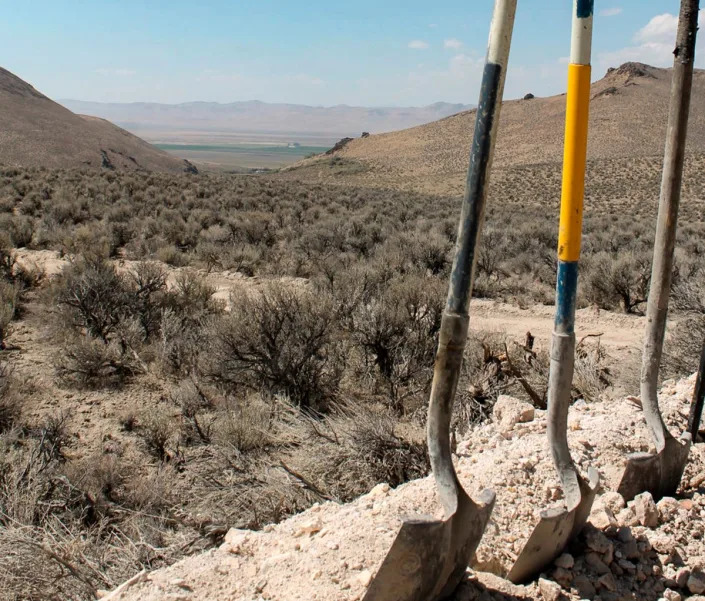Stuti Mishra
Fri, February 10, 2023

Lithium is a crucial mineral for production of batteries (AP)
Significant lithium reserves have been found in India for the first time, in an important discovery that bodes well for the country’s plans to transition into clean energy and a push for electric vehicles.
Lithium is a rare mineral that is highly reactive, lightweight and can store large amounts of energy in a compact space, making it the ideal material for use in batteries.
The demand for lithium has grown globally as countries race to reduce carbon emissions and switch to clean energy. Energy storage plays a crucial role in that.
India has so far remained dependent on foreign supplies for crucial minerals like nickel and cobalt – including lithium – as the country pushes on with its ambitious plans to expand energy storage tech and electric vehicles market.
Now, officials from India’s federal government announced they had found 5.9m tonnes of lithium reserves in the Reasi district of the northern Jammu and Kashmir region.
“For the first time, lithium reserves have been discovered and that too in Jammu and Kashmir,” Mines Secretary Vivek Bharadwaj told reporters.
Describing it as a way for India to become “aatmanirbhar”, a slogan promoted by the Narendra Modi government that means self reliance, Mr Bharadwaj said the critical mineral discovery will aid domestic production of batteries for a number of devices, including mobile phones and solar panels.
Recently, India began a major push for research and development of crucial minerals as part of a national mission on advanced energy storage aimed at developing next-generation energy storage tech that also involves the use of lithium.
The government has set up a task force to explore opportunities for domestic lithium production as well.
“We have re-oriented our exploration measures towards critical and strategic minerals and this discovery is a vindication of our efforts,” Mr Bhardwaj told the Mint business newspaper.
A significant reserve like this can provide a major boost to the country’s plans to expand to establish itself as a dominant player in the global electric vehicle market, Experts say. India aims for electric vehicles to make up 30 per cent of the total vehicles sold in the country by 2030.
However, it’s going to be a long process for the newfound lithium could be in use.
“The discovery of India’s first lithium reserve is a positive step for India’s energy security and EV manufacturing ambitions,” says Siddharth Goel, a senior policy advisor at the International Institute for Sustainable Development.
“But international experience shows that environment permitting and mine development can take 10 years or more. In the short-term, India still needs a strategy to source critical minerals, for its 2030 clean energy and EV targets.”
Aarti Khosla, director at Delhi-based research organisation Climate Trends, says that although the recent discovery of lithium is “encouraging”, the reserves are categorised as being in the “inferred category,” signifying that the quality of the mineral can not be ascertained at this point.
“Before going forward, there is a need to do a preliminary finding via actual extraction to check its feasibility and convert this estimated resource to the exploitable category with a high degree of confidence level and explore its chances of augmenting it.”
As of now, lithium is the only reliable option for producing batteries for electric vehicles because of its high density and ability to retain its charge for a long time.
China is a top player in the production of lithium-ion batteries. More than three-quarters of the total such batteries in the world are produced by India’s neighbour and rival.
But for India, exports form around 80 per cent of the total lithium used by the country. India obtains many minerals – particularly lithium – from Australia and Argentina.
The country had earlier in 2021 found a smaller lithium deposit in the southern state of Karnataka, but experts point out that a discovery like the current one can accelerate India’s production capacity.
Lithium is also key for India’s transition to renewables. Large reductions in the cost of renewable technologies such as solar and wind have made them cost-competitive with fossil fuels in recent years.
Effective storing solutions, however, remain a challenge for the adoption of these intermittent sources of energy for many countries that need low-cost solutions. Lithium-ion batteries are the most commonly used for this, and there has been significant price reduction in them since the 1990s.
Meanwhile, the global demand for lithium is expected to increase by approximately 761 per cent from 2020 up to 2030, according to the Lithium Industry Association’s forecast.
No comments:
Post a Comment